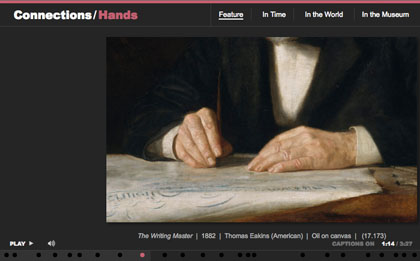It was via a recent tweet by my friend @rellypops that I was introduced to a wonderful collection of resources that got me thinking about student assessment and how we might begin to provide other forms of evaluation that provide more scope for creativity and engagement than the ubiquitous essay.
Narelle’s tweet led me to the Metropolitan Museum of Art’s Connections site that invites its “staff to offer their personal perspectives on works of art in the Museum’s vast collection. Their voices range from the authoritative to the highly subjective, and touch upon any number of themes and concepts.”
What I like about this project of a potential 100 episodes, is that each person brings a knowledge and passion to the subject they are covering. They have selected specific art works from the museum that focus on, or reference a theme, such as Hands, City, Water, Light, Maps, etc. I think this is a great resource and models a nice format that could be used by students to use in assessments such as reports. To take a problem, issue, or topic and to research around that, collecting relevant information in text with illustrative and supporting images, and then creating a story that links the parts to create a snapshot that is greater than the whole. This type of project outcome can quickly become a useful collection to share with other students and a resource to add to an ePortfolio. Are we able to rethink assessment so that it is conceptualised as a potential resource, something of value that is reusable?
Not that everyone has the capacity to develop a website such as this with it production values, but there are a number of other ways to create such a multimedia collection. You could do this as a narrated PowerPoint (such as Pecha Kucha style), or online using Voicethread, or an image sequence in QuickTime with an audio track that is saved as video, or a even with screen capture software such as Camtasia. I’m sure there would be many more… Can you suggest other ways?
Of course this isn’t to dismiss the fact that these could also be done in ‘analogue’ by creating a book or folio by hand. I’m just cognisant of the benefit of a digital format and that is can be shared with many. Is anyone already doing and happy to share their story?
I’d love to hear about your ideas about thinking differently about assessment, particularly in higher education.

